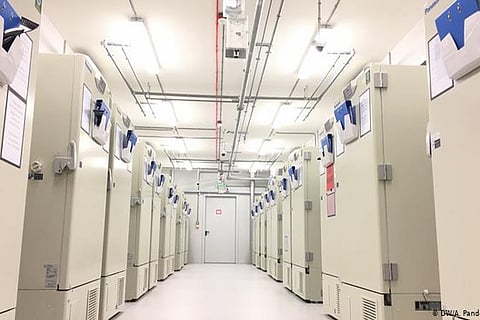

Chennai
Long parallel aisles flanked by columns of nearly two-meter tall freezers, each set to -80 degrees Celsius (-112 Fahrenheit), is where some of the COVID-19 vaccines will be making a pit stop before arriving at your doorstep.
The huge facility — the size of a soccer field — is one of the two freezer farms that US logistics firm UPS is building to safely store millions of doses of coronavirus vaccines and promptly ship them across the world. The farms are part of a global effort that has seen governments, international organisations, pharma companies and logistics firms pump billions of dollars to kickstart mass production of yet-to-be approved vaccines and to boost supply chain capabilities, ensuring they are not caught off guard once the vaccines are given the green light.
“We are currently leveraging our experience and expertise and investing and gearing up to be able to support the pharmaceutical industry, support the battle against the COVID virus,” Anouk Hesen, the head of UPS Healthcare in the Netherlands, said.
The facilities, being built close to UPS air cargo hubs in the United States and Germany, will together house 600 freezers, each capable of storing 48,000 vials of vaccine. The deep-freezers are being set up to store the more fragile vaccines, including those that are based on messenger RNA (mRNA) to produce viral proteins in the body. Hesen did not disclose if the company had already scored any clients for the freezer farms, only saying it was in talks with “leading pharmaceutical companies” without disclosing any names. US company Moderna, Pfizer and BioNTech, a German biotech firm, and Curevac, another German firm, are some of the leading names working on vaccines based on mRNA.
A vaccine’s sojourn
Once ready, vaccines will leave the laboratory in specialised, well-insulated boxes, filled with dry ice or frozen carbon dioxide. The boxes will be brought to one of the freezer farms, where they would be carefully opened on a soft stretcher-like table and stored in freezers. “You would not be able to operate in the freezer farms without personal protective equipment (PPE). So, our people are supplied with the right gear, like specific gloves and goggles to be able to handle the products inside,” Hesen said. “It’s not a temperature that you’ll be able to walk into.”
Based on instructions or orders from customers, the vaccines would be put back in insulated boxes filled with dry ice, capable of maintaining an ideal temperature for up to 96 hours. Depending on how stringent specifications will be, the repackaging will take place in a room with temperature as low as -20 degrees Celsius or one with temperatures ranging from 2 degrees to 8 degrees Celsius — the ideal storage temperature range for most vaccines — to ensure the shots are not compromised.
The vaccines will then be shipped by air while ensuring they remain stable. UPS says it would be able to provide overnight delivery to almost any part of the world thanks to the proximity of its freezer farms in Louisville, in the US state of Kentucky, and the Venlo-Roermond area in the Netherlands, to its air hubs. The firm is also setting up deep-freeze units in some places, including in Frankfurt and the UK.
With COVID-19 vaccines being developed at an unprecedented pace, there is hardly any data available on their fragility or stability. UPS is in talks with vaccine makers and US authorities, including the Operation Warp Speed team — a public-private partnership initiated by the Trump administration to accelerate vaccine development — about how the supply chain would look like. Some experts say the first shipments of the shots would need to be transported at “vaccine-untypical” conditions of -20 degrees Celsius, if not at -80 degrees — a major challenge for freight companies.
UPS is gaining critical hands-on experience; one of its units is involved in delivering COVID-19 vaccines for clinical trials under strict guidelines. The firm, based in the US city of Atlanta, Georgia, was also part of global efforts to distribute huge volumes of PPE kits for health care workers, coronavirus test kits and equipment for intensive care units at the height of the pandemic.
— This article has been provided by Deutsche Welle
Visit news.dtnext.in to explore our interactive epaper!
Download the DT Next app for more exciting features!
Click here for iOS
Click here for Android